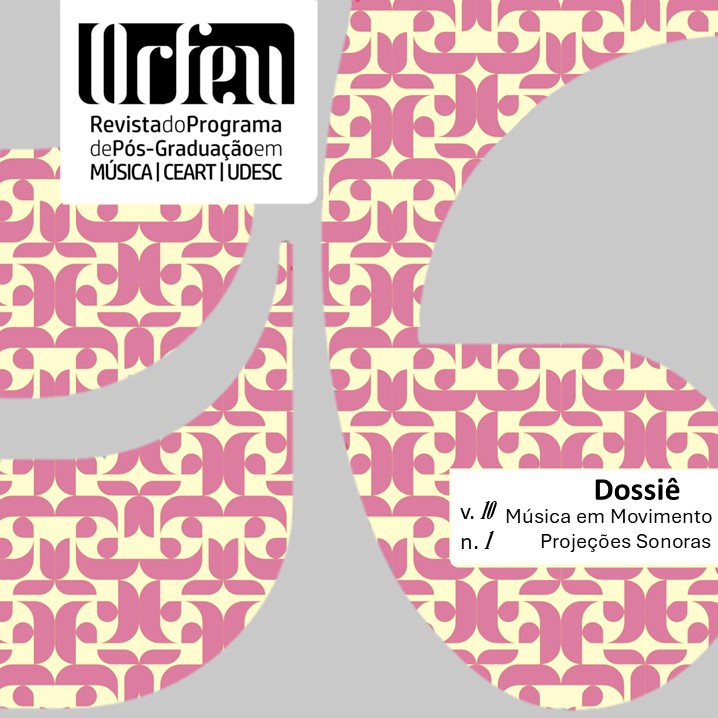Willy Corrêa de Oliveira's Twelve-Tone Composition Course and its potential for the confrontation of teaching musical creation in our time
DOI:
https://doi.org/10.5965/2525530410012025e0107Keywords:
Musical education, musical composition, musical language, music historyAbstract
Illustrating the pedagogical actings of Willy Corrêa de Oliveira in two moments of his career as a teacher –in his work at the School of Communication and Arts at the University of São Paulo, and after his retirement –, this text discusses the difficulties inherent in teaching composition today, as faced by Willy at these two points, given the lack of a common language shared in classical music in our time. A point of greatest interest, then, is the presentation of the pedagogical strategy proposed by the professor in his Twelve-tone Composition Course (unpublished, completed in 2022). As materials and methodology, we use the composer's written essays and interviews provided by him to the authors, from which it is possible to extract the pedagogical guidelines that surround the object of study. The work, in its current stage, concludes that Oliveira's Twelve-tone Composition Course has, in its elaboration plan, the potential to guide students through the process of learning musical composition considering a vision of the practice of classical music today, based on the search for creation, to the detriment of the repetition of models from the past.
liveira in these two moments. A point of greatest interest, then, is the presentation of the pedagogical strategy proposed by the professor in his Twelve-tone Composition Course (unpublished, completed in 2022). As materials and methodology, we use the composer's written essays and interviews provided by him to the authors, from which it is possible to extract the pedagogical guidelines that surround the object of study. The work, in its current stage, concludes that Oliveira's Twelve-tone Composition Course has, in its elaboration plan, the potential to lead students to the mastery of musical composition considering the inherent needs to the practice of creating classical music today.
Downloads
References
BOULEZ, P. Relevés d’apprenti: textes réunis et présentés par Paule Thévenin. Paris: Seuil, 1966.
DE BONIS, M. F. Entrevista cedida a Raphael de Lima Puccini. São Paulo, maio. 2019.
DE BONIS, M. F. Tabulae scriptae: a metalinguagem e as trajetórias de Henri Pousseur e Willy Corrêa de Oliveira. São Paulo: Editora Unesp Digital, 2015.
EISLER, H. A rebel in music: selected writings. Traduzido por Marjorie Meyer. London: Kahn & Averill, 1999. 223 p.
HAUSER, A. Introducción a la historia del arte. Madrid: Guadarrama, 1961.
LEIBOWITZ, R. Schoenberg and his school: the contemporary stage of the language of music. 2. reimpressão. Tradução de Dika Newlin. New York: Da Capo Press, 1979.
OLIVEIRA, W. C. Música: a forma ABA – linguagem e memória. Acta semiotica et linguística,
São Paulo: Sociedade brasileira de professores de linguística, v.1 n.1, p.83-98, 1977.
OLIVEIRA, W. C. Ângulos hipóteses hipotenusas. São Paulo, 2016. Texto. 10 páginas. Não publicado.
OLIVEIRA, W. C. Caderno de Ensaios. São Paulo: Editora da Universidade de São Paulo, 2019a. 102 p.
OLIVEIRA, W. C. Caderno de Pânico. São Paulo: Editora da Universidade de São Paulo, 2019b. 102 p.
OLIVEIRA, W. C. Caderno do Princípio e do Fim. São Paulo: Editora da Universidade de São Paulo, 2019c. 60 p.
OLIVEIRA, W. C. Entrevista cedida a Raphael de Lima Puccini. São Paulo, maio. 2019d.
PUCCINI, R. L. Willy Corrêa de Oliveira como professor: estudo sobre seu projeto pedagógico de ensino da composição musical: da virada do século XXI até os dias atuais. São Paulo, 2019. 324 f.: il. + anexos. Dissertação (Mestrado em Música). Universidade Estadual Paulista “Julio de Mesquita Filho”, Instituto de Artes, São Paulo, 2019. Disponível em: https://repositorio.unesp.br/items/c42b237b-8280-4825-892c-f663396427d6 Acesso em 11 jun. 2024.
RILKE, R. M. Cartas a um jovem poeta. Tradução de Pedro Süssekind. Porto Alegre: L&PM, 2009. 96 p.
SCHLOEZER, B. Igor Stravinsky. Éditions Claude Aveline: Paris, 1929.
SCHOENBERG, A. Fundamentals of musical composition. Londres: Faber and Faber, 1967.
Downloads
Published
How to Cite
Issue
Section
License
Copyright (c) 2025 Raphael de Lima Puccini, Maurício Funcia De Bonis

This work is licensed under a Creative Commons Attribution 4.0 International License.
Authors who submit their manuscripts to be published in this journal agree to the following terms:
1. Authors retain the copyright and grant to the journal the right of first publication, whilst simultaneously permitting their work to be licensed under the Creative Commons License Attribution, which allows the sharing of work with recognition of the authorship and initial publication in this journal.
2. Contributions in this journal are open access; this means they are based in free use, and non-commercial applications.






